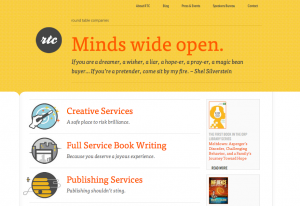 It’s no secret that content marketing is growing by the day. Need proof? Just check out the attendance rates for this year’s Content Marketing World, the biggest content marketing event on the planet.
It’s no secret that content marketing is growing by the day. Need proof? Just check out the attendance rates for this year’s Content Marketing World, the biggest content marketing event on the planet.

This year, more than 2,600 marketers from more than 50 countries attended, including marketers from 36 of the Fortune 100 companies. And did I mention that Kevin Spacey was the closing keynote? Yeah, this event was huge.
This is my fourth CMW, and when looking around the exhibit hall, it’s obvious that content marketing isn’t a niche industry anymore. Big software players and other large companies swallowed up huge chunks of booth real estate at CMW 2014, and a few of the private events scored the same number of people who attended the very first CMW in 2011.
The conference covered the full spectrum of content marketing, from heated panel discussions on native advertising to advanced presentations on the globalization of content. But there was one thing conspicuously absent from the conference: advertising agencies.
On the plane ride back to Kansas City, Missouri, I pulled out the business cards I had collected and started reflecting back on all the people I met. Among my three teammates and me, we’d only bumped into a handful of agencies, which seems like a huge missed opportunity.
Right now, the agency world is struggling with content marketing. But the need and opportunity for agencies to make an impact has never been greater. In fact, a recent research report from the Content Marketing Institute indicated that producing engaging content is the No. 1 challenge for marketers. Last time I looked, that’s what agencies do.
So what’s keeping ad agencies from mastering content marketing? According to sessions and panels at CMW, there are several factors:
1) Agencies are focusing on creative work, not strategy.
Most ad agencies are still structured to create and support traditional, paid-media initiatives. This means that they’re just operating as creative production shops, not strategic leaders.
But this isn’t a sustainable model anymore. Even with great creative, people just tune out and move on. To build an effective strategy, marketers have to focus on identifying audience needs and understanding their buyers’ journey.
2) They’re not digging deep enough into their target audience.
Usually, if agencies do upfront research, they aren’t asking the right questions, which leads to weak, demographic-focused strategies.
To do content marketing well, agencies will need to identify buyer insights that translate into valuable content. From there, content strategy — figuring out how content will be planned, created, managed, distributed, and governed — must be thought out and planned before execution begins.
3) They’re operating in “campaign” mode.
Agencies are still limiting their efforts by focusing on pushing sales during a short campaign window. But why can’t the cash register ding all the time? It’s time to start shifting focus from building short-term campaign assets to high-value content that pays long-term dividends. That’s when clients begin to see real value.
4) They’re creating self-serving content.
In his keynote presentation, Andrew Davis noted that marketers have been developing marketing strategies based on a “funnel” concept that dates back to 1898. But is that linear flow really the path we follow online? Davis argues that it isn’t. Instead, he walked the audience through one of his own manic click paths that began with a “moment of inspiration,” a craving for meatloaf, and ended with him buying tickets for a Meat Loaf concert. Funnel that!
The lesson for marketers is that self-serving content won’t create a “moment of inspiration” for customers. Instead, agencies and brands should create great stories that inspire action and try to identify related triggers that may draw customers to a brand’s products.
5) Content marketing isn’t easy.
Make no mistake: It’s difficult to build a content marketing strategy, and it’s also difficult to educate and sell clients on the value of this approach and execute it every day. But this is a rich opportunity to help your clients stand out and move the needle with a well-thought-out content marketing effort.
Agencies have been telling stories for decades, and content marketing is just a better way to use that skill set in our digital world. To create work that drives results, marketers must be hyper-focused on connecting with customers and inspiring them to take action.
![How to Spell Words You Don't Know: Techniques From Grammar Experts [Infographic]](http://53.fs1.hubspotusercontent-na1.net/hubfs/53/00-Blog_Thinkstock_Images/spelling-lessons.png)








